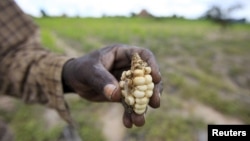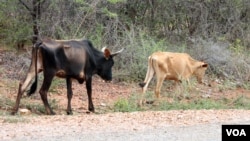Zimbabwe's government this week launched a $1.5 billion international appeal for assistance to avert hunger, as some parts of the country are feeling the pinch of severe drought conditions blamed on the El Nino weather phenomenon and resulting food shortages.
Chivi district, in Masvingo province about 350 kilometers south of Harare is one of the areas hard hit by hunger in Zimbabwe. In Madzivadondo village, the land is dry, nothing is green.
There are no crops although it is supposed to be the growing season. Cattle and other domestic animals — those still alive — look as hungry and hopeless as the villagers. Eighty-five year old Rameki Madzivadondo said he has never seen things this bad.
He said there used to be hunger, but never like this. He said his cattle have all died and there is no hope anywhere around. People are suffering. There is nothing to eat.
Nothing to eat
Zimbabwe Vice President Emmerson Mnangagwa said there are actually three million people in Madzivadondo’s predicament, going for days without anything to eat.
Zimbabwe’s appeal was made to the United Nations and humanitarian organizations such as USAID.
Some aid already provided
Bishow Parajuli, the U.N. Resident Coordinator in Zimbabwe, said the world body was already providing aid before the latest appeal came in.
"So far about six million [dollars] was mobilized and close to a million people are being reached with food support. Given a new challenge in terms of doubling this affected population, the need is almost doubled. Badly, the situation is really bad in the entire continent. Recently, Ethiopia came in a big way, saying they have over 10 million affected," Parajuli said.
According to the Famine Early Warning Systems Network — a provider of early warning and analysis on food insecurity — El Nino has led to dryer than average conditions in some parts of the Horn of Africa — such as Ethiopia — and in southern Africa, affecting countries like Zimbabwe, Malawi, Lesotho, Zambia, Swaziland, South Africa, and Mozambique.





